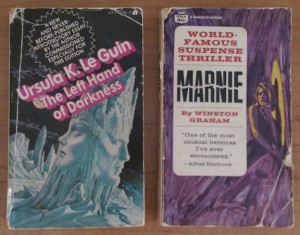After I packed off my inner Cinderella to find a new home last month, I considered what other stories from my childhood might still be affecting my life in the present. No other fairy tales came to mind. Then it occurred to me that my bookshelf would be a good place to investigate, on the premise that any books I’d kept that long probably had a significant impact on my worldview, even if I wasn’t consciously aware of it.
I found two paperback novels that I had bought from a used book store as a teenager. One of them was The Left Hand of Darkness, a sci-fi adventure by Ursula K. LeGuin. The other was Marnie, a psychological drama by Winston Graham that became a Hitchcock movie.

Marnie’s influence on my teenage mind could easily take up a whole long post in itself, so I’ll save that for another day and briefly sum up the plot of The Left Hand of Darkness. An envoy from Earth visits an alien world seeking to establish diplomatic relations on behalf of an interplanetary alliance. This world is deep in an Ice Age, inhabited by a genderless species, and on the brink of war between its two major nations.
The narrative is told alternately through the envoy’s report and through the journals of Estraven, who is the prime minister of one of the feuding nations when the story begins. Estraven hopes to prevent a war by supporting the envoy’s mission, but instead is declared a traitor for doing so and must flee in disgrace to the other nation. The envoy then visits the other nation and gets seized by the secret police and sent to a labor camp to die.
Estraven stages a heroic rescue, guiding the envoy to safety across a glacier in winter. The mission ultimately succeeds and war is averted, but the cost is Estraven’s life; a friend’s betrayal leads to Estraven being shot to death at the hands of the pro-war faction.
A defining trait of Estraven’s character, and the one that made a lasting impression on me, was a strong reliance on intuition. Estraven had faith in being able to recognize moments when taking action can change the world. This led both to extraordinary political success and to the unhesitating sacrifice of that success to the greater good.
When I got involved in social activism over a decade ago, I felt confident—like Estraven—that I had the power to change the culture and that I could trust my intuition to guide me. Although my efforts succeeded, I got overly stressed out by thinking in terms of going into battle, as I described here. Consistent with Estraven’s fate, I expected that success would mean enemies were out to get me.
Last week, in the interest of banishing that residual fear, I decided to charter an imaginary spaceship for a social visit with Estraven on that icy, unforgiving planet.

(Creative Commons image via flickr)
I brought down my spaceship behind a farmhouse on a hill, where Estraven was in hiding after the glacier adventure. Not long before sunset, a pale light stretched across the horizon; thin clouds looked like distant islands in a frozen sea. After putting on heavy winter clothes and tall boots, I trudged through the deep snowdrifts and up a wide stairway to a thick wooden door set high above the ground.
The door opened into a cheerful parlor where a fire blazed brightly on a red stone hearth. The room was otherwise unheated and felt very chilly to me; the people of this world had a much different idea of comfortable room temperature. Estraven, dark eyes glittering in a gaunt face scarred by the bitter cold of the glacier, hospitably offered me a mug of hot beer poured from a jug on the hearth.
Taking note of my unusual clothing and alien appearance, Estraven spoke calmly, in a voice higher than a man’s but lower than a woman’s. “You are one of the Envoy’s colleagues, newly arrived?”
Sipping my hot beer, I decided that this peculiar drink suited the frozen surroundings well. “No, I’m just a spectator who happened to get caught up in the story.”
Eyes gleaming with curiosity beneath a mat of dark hair, Estraven politely remained silent, waiting for me to explain. I still wasn’t quite sure how to phrase my question, although I’d thought about several alternative wordings while on my way here.
“One thing I’ve been wondering,” I finally said, “is what makes it possible to act from intuition without fear of the consequences. Although you have enemies, somehow that doesn’t seem to trouble you…”
The firelight glinted from even white teeth as Estraven smiled. “At present, what I have is this comfortable shelter and a mug of hot beer.”
“Mindfulness—just being in the moment,” I said softly to myself; and then my voice rose in mild annoyance with my own cluelessness, although I didn’t consciously notice at first. “Well, doggone it, I should have known that!”
Estraven smiled even more broadly, raising the beer mug in a friendly toast. “Often, it’s not the new insights that do us the most good, but rediscovering the truths we already know.”







